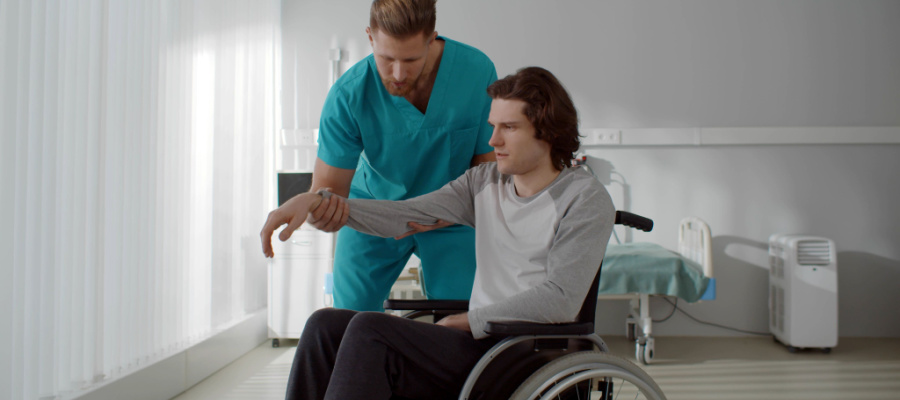What Are the Stages of Paralysis?
Paralysis is a condition that can drastically impact a person’s ability to move, function, and live independently. Even caused by spinal cord injuries, stroke, neurological disorders, or other underlying health issues, paralysis can progress in stages. Understanding these stages is crucial not only for medical professionals but also for individuals and families navigating the journey of paralysis.
At Devoted Helpers, a compassionate home care agency in Sugar Land, Texas, we are dedicated to providing the highest level of care for individuals with paralysis. In this article, we’ll explore the stages of paralysis, how the condition progresses, and the vital support that Devoted Helpers offers at every stage to help individuals and families cope.
What is Paralysis?
Paralysis refers to the loss of muscle function in one or more parts of the body. It occurs due to damage to the nervous system, particularly the spinal cord or brain. Depending on the severity and location of the injury, paralysis can range from partial to complete loss of movement and sensation.
There are several forms of paralysis, including…
- Monoplegia – Paralysis of one limb.
- Hemiplegia – Paralysis of one side of the body.
- Paraplegia – Paralysis of the lower half of the body, including the legs.
- Quadriplegia (Tetraplegia) – Paralysis of all four limbs.
The stages of paralysis can vary depending on the cause and the individual’s unique condition. Understanding these stages is essential to managing the care, rehabilitation, and emotional well-being of individuals experiencing paralysis.
What Are the Stages of Paralysis?
Paralysis can develop in various ways, depending on the cause of the condition, but typically, paralysis progresses through different stages. The stages of paralysis may be broken down into acute, subacute, and chronic phases. Here’s an overview of each stage…
a. Acute Stage
The acute stage is the initial phase that typically occurs immediately after the event or injury that causes paralysis. This is the time when the body experiences the most significant damage, and paralysis begins to set in. For example, following a spinal cord injury, this stage is marked by loss of sensation and muscle function in the affected areas.
During the acute stage, medical attention is critical. If the paralysis is the result of an injury or stroke, emergency medical intervention is required to stabilize the patient and prevent further damage to the nervous system. Depending on the severity of the injury, there may be a possibility of recovery or improvement in function, though this isn’t always the case.
For individuals with spinal cord injuries, the acute stage may last for several days to weeks, depending on the level of injury. Early treatment is essential to reduce the risk of permanent damage, and medical professionals will work on stabilizing vital functions, preventing complications, and providing the initial support necessary.
b. Subacute Stage
Once the acute stage has passed, the individual enters the subacute stage, which can last several weeks to months. During this time, medical attention continues, but the focus shifts to rehabilitation and functional recovery.
In the subacute stage, individuals with paralysis may begin physical therapy, which aims to…
- Improve mobility – Depending on the severity of the paralysis, some individuals may regain limited function, while others may learn to use assistive devices like wheelchairs or exoskeletons.
- Prevent secondary complications – Care in this stage is crucial to manage the risks associated with muscle atrophy, pressure ulcers, and respiratory issues. Regular monitoring is necessary to ensure the best possible outcomes.
- Emotional and psychological support – The transition from an active, independent life to one with paralysis can be overwhelming. Psychological counseling or therapy is often needed to help individuals and their families cope with the emotional impact of the condition.
The subacute stage is also the time when in-home care services such as those offered by Devoted Helpers in Sugar Land can be beneficial. A caregiver can assist with personal care, mobility support, and emotional encouragement, ensuring that the individual receives optimal care and attention.
c. Chronic Stage
The chronic stage is the long-term phase of paralysis, where the individual’s condition stabilizes. This stage can last for many years, and in some cases, for the rest of the individual’s life. In the chronic stage, the primary focus is on maintaining function, preventing complications, and promoting quality of life.
For individuals in the chronic stage of paralysis, managing ongoing challenges such as incontinence, bowel and bladder care, pressure ulcers, and respiratory health is crucial. Depending on the severity of the paralysis, individuals may require ongoing assistance with daily activities, including bathing, dressing, feeding, and transferring.
Maintaining physical and emotional well-being remains a priority. Caregivers play an essential role in providing companionship, monitoring health, and supporting activities to help the individual maintain social connections and independence.
How Paralysis Affects Life and Daily Living
While paralysis itself may not always be life-threatening, it can affect many aspects of an individual’s life, including mobility, health, mental well-being, and independence. The severity of paralysis and the level of care required will depend on the location and extent of the paralysis, as well as the underlying cause.
Some common effects of paralysis include…
- Loss of muscle function – This can result in limited or no movement in certain parts of the body, affecting the ability to walk, use the hands, or perform daily activities.
- Bowel and bladder issues – Paralysis can affect control over the bladder and bowels, leading to incontinence and requiring specialized care.
- Respiratory issues – In severe cases, paralysis can impair the ability to breathe properly, especially if the diaphragm or respiratory muscles are affected.
- Psychological impact – The emotional toll of living with paralysis can lead to depression, anxiety, and a sense of loss, making mental health support an essential part of care.
How Devoted Helpers Supports Individuals with Paralysis
At Devoted Helpers, we understand that living with paralysis requires not only medical attention but also a compassionate approach to caregiving. Whether in the acute, subacute, or chronic stage of paralysis, our team of trained caregivers provides specialized in-home care that supports both physical and emotional well-being.
Our services include…
- Personal care – Assistance with bathing, grooming, dressing, and other daily activities.
- Mobility support – Helping with transferring, positioning, and ensuring safe movement.
- Health management – Monitoring vital signs, managing medications, and preventing complications such as pressure ulcers or infections.
- Emotional support – Providing companionship and addressing mental health needs to reduce feelings of isolation and depression.
- Physical therapy assistance – Helping with exercises and mobility strategies to maintain or improve function.


